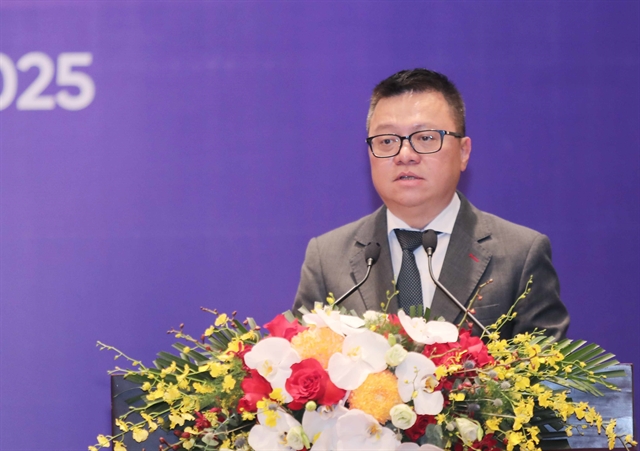 Society
Society


|
| Chairman of the Vietnam Journalists' Association Lê Quốc Minh speaks at the forum on Friday. — VNA/VNS Photo |
HÀ NỘI — The second National Press Forum, which wrapped up in Hà Nội on June 20, was a great success, opening up a creative space and elevating the strategic vision for Việt Nam’s revolutionary press as it advances alongside the nation, Chairman of the Vietnam Journalists' Association Lê Quốc Minh affirmed.
Minh, who is also Head of the Steering Committee for the National Press Festival 2025, said that the forum has become a remarkable highlight in the series of events commemorating the 100th anniversary of the Vietnam Revolutionary Press Day, drawing special attention from the press community and the public over the past two days.
He appreciated the dedication, enthusiasm, and strong commitment of nearly 70 speakers who contributed to the forum, affirming that the active participation of hundreds of delegates, including journalists, media agency leaders, press managers, journalism students, and media enthusiasts, resulted in 12 high-quality sessions. Notably, the 10 thematic panel discussions were well-organised and methodically conducted, featuring highly topical themes and rich content that captured strong interest from both the press circle and the wider public.
Amidst a rapidly transforming world driven by digital technology, artificial intelligence (AI), and globalisation, Vietnamese journalism is facing unprecedented challenges, yet also tremendous opportunities, provided it can proactively adapt and innovate. One of the most pressing challenges is the rise of social media video content and individually generated news, which poses a direct threat to mainstream media outlets.
This new era presents journalism with chances to reaffirm its leadership role. In the context where AI dominates and produces vast volumes of content, the only sustainable path forward for journalism is to focus on high-quality content and core values. Journalism must redefine its mission - not to report the fastest, but to provide the most profound and trustworthy value.
These pressing concerns were at the heart of discussions at this year’s National Press Forum. The forum served not only as a space for intellectual exchange and dialogue among journalists nationwide but also as a platform for exploring innovative approaches to transform Vietnamese journalism, aiming toward a truly professional, modern, and human-centered journalism in this era of the nation’s rise, Minh added.
At the first session 'Vietnamese journalism in the new era: Vision for creating development space,' delegates and experts discussed challenges, opportunities as well as key solutions for the sustainable development of Vietnamese journalism.
Meanwhile, the session on AI and digital transformation strategy of Vietnamese newsrooms attracted many managers, experts, and journalists.
They shared the view that AI opens up unprecedented opportunities for the Vietnamese press and media industry from improving the content quality to increasing social impacts, helping newsrooms adapt to the digital era and meet the increasing information needs of the public.
At the fifth session on revenue in the digital age, speakers stressed that newsrooms must focus not only on producing quality content but also on securing sufficient funding to sustain operations.
Other sessions covered topics such as female leadership in journalism, strategies to engage Gen Z, how television is adapting to the new media landscape, and mechanisms to develop radio in the current context.
Notably, the 10th session on Resolution 18 and the requirement for innovation in press personnel attracted the public and journalists. The resolution, aimed at streamlining the political system, called for a leaner press sector to enhance its effectiveness.
However, streamlining is not just about mergers, downsizing, or staff cuts. It’s also about optimising resources, minimising waste, and improving operational efficiency. The process presents an opportunity for press agencies to innovate their organisational models, build convergent newsrooms, and modernise workflows. — VNS




